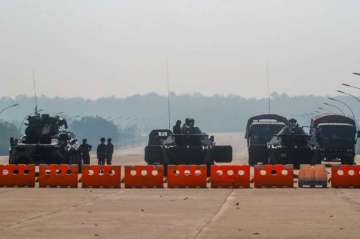China's UN envoy: Myanmar violence could lead to civil war
China's UN ambassador on Monday urged stronger diplomatic efforts to resolve the confrontation in Myanmar since the Feb.

China's UN ambassador on Monday urged stronger diplomatic efforts to resolve the confrontation in Myanmar since the Feb. 1 military coup, warning that further violence could lead to a chaotic situation "and even a civil war". Zhang Jun also warned that “any wrong handling” might lead to further tension in Myanmar.
The UN Security Council on Friday strongly backed calls by Southeast Asian nations for an immediate cessation of violence and talks as a first step toward a solution following the military coup in Myanmar that ousted civilian leader Aung San Suu Kyi and her party and reversed years of slow progress toward democracy.
The council again demanded the restoration of democracy and the release of all detainees including Suu Kyi and condemned the use of violence against peaceful protesters and the deaths of hundreds of civilians.
Zhang, who described Myanmar as "a friendly neighbour", strongly backed diplomatic efforts by the Association of Southeast Asian Nations known as ASEAN and by UN special envoy for Myanmar Christine Schraner Burgener, and expressed hope they would produce results. He said “China is not in favor of imposing sanctions."
"We should really be creating a more favourable environment for bringing the country back to normal and finding a political solution through dialogues among the relevant political parties within the constitutional and legal framework," he said.
Myanmar for five decades had languished under strict military rule that led to international isolation and sanctions. As the generals loosened their grip, culminating in Suu Kyi's rise to leadership in 2015 elections, the international community responded by lifting most sanctions and pouring investment into the country.
The coup took place following November elections, which Suu Kyi's party won overwhelmingly and the military contends was marred by fraud.
"It's mainly an issue relating to the difference on the election," Zhang said. "The political parties should be able to find a solution on that. So that's why China prefers ... more diplomatic efforts."
“That's why China is working very closely with the relevant parties urging them really to refrain from going extreme, avoiding violence, avoiding casualties, and try to find a solution with dialogue. That's why the council is also now giving full support to the diplomatic efforts of ASEAN,” he said.
Zhang was asked whether China was concerned that Myanmar could descend into civil war, given that its military is fighting the Kachin and Karen ethnic minorities, which maintain their own armed forces, while also confronting pro-democracy protesters — amid reports that civilians, mainly students, are now receiving training in the use of weapons in ethnic areas.
“We do have similar concerns,” Zhang said. “We do believe that with diplomatic efforts we can avoid the further escalation of the tension.”
“With further escalation of the tension, there will be more confrontation, and with more confrontation there will be more violence, and with more violence there will be more casualties, and then we may go further down the wrong direction,” he warned. “It may also mean a chaotic situation in Myanmar and even a civil war.”
Zhang said China is also very concerned about the humanitarian impact of the crisis, citing UN envoy Schraner Burgener who pointed to more poor people losing jobs, civil servants refusing to work to protest the junta, and a brewing crisis of families in and around the main city Yangon “pushed to the edge” for food, going into debt and trying to survive.
In her briefing to the council Friday, obtained by The Associated Press, she also cited a World Food Programme report that the combination of existing poverty, the COVID-19 pandemic and the political crisis have led to a sharp rise in “hunger and desperation,” and that within six months up to 3.4 million more people will suffer from hunger, particularly those in urban areas.
In again urging a diplomatic solution, Zhang warned that with further deterioration “definitely a humanitarian disaster or crisis will be inevitable so we do need to try our best to avoid that.”